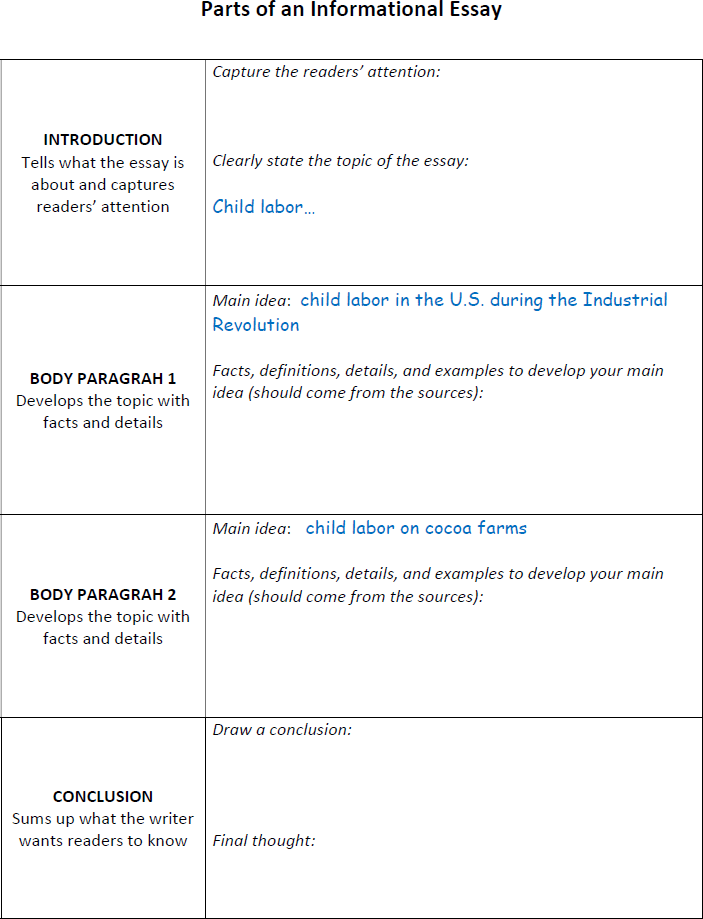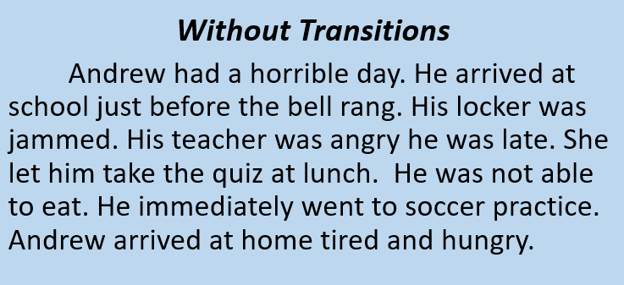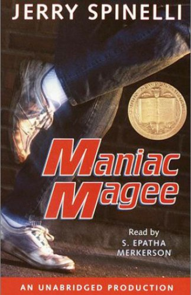Writing
to Inform (Part 2)

Unit Overview
In this unit you will review the structure of informational
texts, read two sources, and write an informational essay. Additionally, you
will revise your essay focusing on adding transitional words and phrases and
learning to edit by recognizing and correcting errors. Then, you will review the prefixes you have learned in units 1-5. Finally, you will continue reading the
novel Maniac Magee by Jerry Spinelli.
· I can conduct short research projects to
answer a question, drawing on several sources and refocusing the inquiry when
appropriate.W.6.7.
· I can develop and strengthen writing as
needed by planning, revising, editing, rewriting, or trying a new approach. W.6.5.
Informational Writing Review
Informational writing teaches or explains a topic to
readers. The writer uses facts, definitions, quotations, and examples-often
from research-to develop the topic.
Key Features of Informational Writing:
· an introduction that clearly states a topic and prepares readers to
learn about the topic
· facts and details that are logically
organized in paragraphs precise language and domain-specific vocabulary that
express ideas concisely and accurately
· linking words, phrases, and clauses
that connect one idea to the next
· a conclusion that restates the topic,
sums up the important points, and leaves readers with something to think about
An
informational essay is divided into three sections, the introduction, body, and conclusion.
|
INTRODUCTION Tells what
the essay is about and captures readers’ attention |
The introduction to an informational
essay should clearly state the topic. It should also grab readers' attention
and make them want to keep reading. Here are three different approaches: · Show the importance of the topic in your readers’
everyday lives. · Ask a question to make readers curious and get them
thinking about possible answers. · Make an observation that will help readers know what
aspect of the topic your essay will focus on. |
|
BODY Develops the
topic with facts and details |
The body of your essay should include
paragraphs that support and explain your topic. You should: · Group related information into paragraphs. · Include facts, definitions,
details, and examples to develop your ideas. · Use precise language and
domain-specific vocabulary to present ideas accurately. · Use linking words, phrases, and
clauses to connect your ideas and make them easy to follow. |
|
CONCLUSION Sums up what
the writer wants readers to know |
Conclude your essay by summing up your
main points. You can also use these approaches: · Draw a conclusion or make a statement based on the
information you presented. · Give your readers a final thought
about the topic. |
Remember the steps of writing:
Step 1: Unpack Your Assignment
Step 2: Find Evidence
Step 3: Organize Your Evidence
Step 4: Draft Your Essay
Step 5: Revise and Edit for
Conventions
In the previous unit, you read an example of an
informational essay. Now it’s your turn to write an informational article.
Step 1: Unpack Your
Assignment
Prompt: Write a multi-paragraph
response that compares how child labor during the Industrial Revolution
compares to child labor today on cocoa farms. Be sure to address the problems
with child labor and how people created change in both situations. Use
information from both passages to support your response.
To prepare to write your essay, you
will read the following sources:
CommonLit | The Life of a U.S. Industrial Worker | Free
Reading Passages and Literacy Resources
The Life of a U.S. Industrial Worker PDF
CommonLit | Chocolate from Children | Free Reading Passages
and Literacy Resources
Step 2: Find Evidence
During this step you will reread the
sources above in order to identify important details about child labor to use
in your essay. Use questions 1-7 to help you.
Step 3: Organize Your Evidence
For this assignment, you are going to use the following graphic organizer:
 |
Either print out a copy here or create your own on
a separate sheet of paper.
Step 4: Draft Your Essay
Remember, in the drafting stage
of writing, you form all of your ideas into sentences and paragraphs. These
paragraphs must be organized in a logical way, or readers might not understand
what you are trying to communicate. In the informational essay, you will have
an introduction, body, and conclusion. Remember the following example from the previous
unit:
|
INTRODUCTION Attention
grabbing beginning Sentence that clearly states the topic |
There
are countless parks in the world that amaze people every day with their
magnificence.
However, forests are being destroyed rather than being conserved. One of
these parks is Yosemite Valley, which is a beautiful valley with gorgeous
sequoia trees. Famous outdoorsman and
preservationist, John Muir, tried to save the Yosemite Valley through a
camping trip with President Roosevelt attempting to convince him to conserve
this valley. The camping trip helped John's goal of preserving
nature by informing the president about what was happening and why they
should stop, showing the true beauty of the valley, and persuading President
Roosevelt to care for the valley and take action. |
|
BODY Group related information
into paragraphs based around a main idea Facts,
definitions, details, quotes, and examples Precise
language and domain specific vocabulary |
The
Yosemite Valley was being destroyed for a variety of reasons. President Roosevelt already felt
strongly about forest conservation and the points highlighted by John Muir just proved
even more why the parks should be protected. First,
the sequoia trees were being chopped down, hurting the ecosystem around it. Next, the
consequence of not conserving forests was that, if not dealt with, the once
beautiful forests would be gone. According
to the article, Bully for Yosemite, "But
the temple went unprotected. Giant sequoias were ripped from the earth,
washing soil into clear streams that became choked with mud. The only way to
save the valley was to make it a national park as well. Muir needed help.”
This shows that the trees were
being torn down which was hurting the environment.
The camping trip also showcased the magnificent beauty of the park. In
many ways, the park was beautiful but that camping trip was the perfect time
really show off some of the greatest things about the valley. Muir showed Roosevelt the view from
the top of Glacier Point and he loved how gorgeous it looked. They saw the magnificent sequoias and were astonished by their
size and how old they were. Also,
it snowed the night of their second day there
and that shows how the weather can change so quickly which is fascinating. According to the article, Bully for
Yosemite, "That day Yosemite did its best
to dazzle the President. Roosevelt whistled to the birds, and they obligingly
whistled back. The sunlight glittered on the rocks and cliffs. All the while,
Muir pointed out the desperate plight of this picturesque valley."
This shows that the valley is
beautiful and the two of them just loved it there. Plus, the trip persuaded
Roosevelt to take action. Since
the trip was so astonishing, the impact that it had on Roosevelt was that he
was persuaded to take action to help the valley to be conserved better. Muir
gave much information to persuade him and also took this trip as an
opportunity to help save the valley. Plus,
since Muir had been in the park previously, he
knew just what would make Roosevelt want to help conserve the valley. It all
paid off though. According to the article Bully for Yosemite,
"Muir and Yosemite did their work well.
Just days after his camping trip, Roosevelt gave a passionate speech urging
forest preservation.” This shows that it all worked out in the end
and that now forests were going to be conserved better. All of these reasons
make why the camping trip really helped the journey to help conserve the
forests. |
|
CONCLUSION Draw a
conclusion Final
thought |
Overall, the
journey to help conserve forests came to a successful end, especially for
Yosemite Valley. The camping trip helped forest conservation as it
informed what was happening and possible solutions to it, it showed the
beauty of the park, and it persuaded Roosevelt to take a stand and take
action for this cause. To help support the
cause, you can go online, find a trustworthy forest conservation cite, and
donate to help save these beautiful forests. |
Step 5: Revise
Remember, revising is the writing stage where you look for ways
to improve the
focus, structure, ideas, and language. When revising, you will reread your essay to make sure all of the
details fit under the topic of the paragraphs they are in; you will make sure
to use a mix of long and short sentences; and you will be sure to include transitions
to connect your ideas.
Language Lesson: Using Transitional Words
and Phrases
·
I
can use appropriate transitions to clarify the relationships among ideas and
concepts. L6.2c
The following paragraph
has been revised so that it uses the appropriate transitions.
Hover your cursor over
the box to see the revised paragraph.

The paragraph without
transitions is choppy and disconnected. The paragraph with transitions flows
nicely.
Good writers
use transitions or words and phrases that connect
ideas in sentences and paragraphs. Writers who show these connections make
their writing easier to understand. A word or phrase can signal an addition, a cause
and effect, a comparison, or a contrast.
|
Connection |
Words and Phrases |
Examples |
|
Addition |
additionally, also, as well as, besides, furthermore, in addition,
moreover |
Jamestown Colony had a deep harbor. In addition, the location seemed easy to defend. |
|
Cause
and Effect |
cause and as a result, because, consequently, due to, in order that,
since |
People in London organized the colony because they hoped the colony
would make them rich. |
|
Comparison |
in the same way, likewise, similarly |
Native Americans often gave gifts of food to the colonists. They were likewise friendly when trading. |
|
Contrast |
although, but, even so, however, nevertheless, still, yet |
Although no Native Americans lived
at Jamestown, many lived nearby. |
Go ahead and
revise your essay using the following questions to guide you:
Revise:
Do I state my
topic clearly?
Do I include
enough facts, details, and examples to support my ideas?
Are all my
details clearly related to the topic?
Do I included
transitions to connect my ideas?
Step
5 (cont.):
Edit for Conventions
Editing your writing involves checking for correct grammar,
spelling, punctuations, and capitalization.
Language Lesson: Recognizing and Correcting
Errors
·
I
can recognize variations from standard English… in their own and others’
writing... L6.1e
Mistakes in
spelling, capitalization, grammar, and punctuation can make it difficult for
your reader to understand that you have written. You should always proofread your writing and correct your errors. An easy way
to show corrections is to use proofreading marks.
Watch the
following video that describes how to use proofreading or editing marks.
 |
HINT: Print
out a copy of your essay and use the editing marks to edit your paper. Even
better, ask someone else to edit your paper with you.
Go ahead and
edit your essay using the following questions to guide you:
Edit:
Are all of the
words that begin a sentence capitalized?
Do I end every
sentence with punctuation?
Did I spell
everything correctly?
Did I indent
every paragraph?
Word Study
· I can use common, grade
appropriate Greek and Latin affixes and roots as clues to the meaning of a
word. L6.4b
English
words come from many languages, including Greek and Latin.
A
root is a word part that usually can’t stand alone as a word. Sometimes
one root is added to another root to make a word. Affixes are word parts such
as prefixes and suffixes that are added to roots to make words. Knowing what affixes
and roots mean can help you figure out the meanings of words. As you learn
Greek and Latin roots and affixes, your vocabulary will grow.
During
the course of this class, you will be learning Greek and Latin roots, prefixes,
and suffixes- each unit a new one will be added to the chart below.
Review the Greek and
Latin prefixes that you have already learned.
|
Suffix |
Root |
Meaning |
Examples |
Additional
Information |
|
|
en- em- |
|
|
to cause to be/to put into or onto/ to go into or
onto |
encounter, enable, employ, embark, encircle |
|
|
fore- |
|
|
before/ earlier |
foreword, forearm |
|
|
de- |
|
|
reduce down/ away from |
defeat, deform, decrease |
|
|
trans- |
|
|
across/ change/ through |
transformation, transportation, transfer |
|
|
anti- |
|
|
opposite/ against |
antibiotic, antifreeze |
|
STOP! Use the chart
of roots/affixes to answer the Word Study Review questions.
Independent Reading
· I can read and comprehend literature
independently and proficiently. RL6.10
Maniac Magee by Jerry Spinelli: Reading Assignment - Chapter 7

Log your reading time in the Log Entry Question.